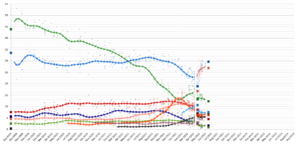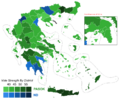PASOK facts for kids
Quick facts for kids
Panhellenic Socialist Movement
Πανελλήνιο Σοσιαλιστικό Κίνημα
|
|
|---|---|
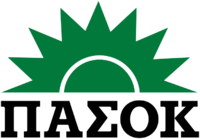 |
|
| Abbreviation | PASOK ΠΑΣΟΚ |
| President | Nikos Androulakis |
| Founder | Andreas Papandreou |
| Founded | 3 September 1974 |
| Preceded by | Panhellenic Liberation Movement |
| Headquarters | Chariláou Trikoúpi 50, 106 80 Athens |
| Student wing | Panhellenic Combative Student Faction (ΑΣΠ) (universities' organization) Panhellenic Combative Student Movement (ΠΑΜΚ) (school organization; dormant) |
| Youth wing | PASOK Youth |
| Trade union wing | Panhellenic Trade Union Movement of Workers (ΠΑΣΚΕ) |
| Membership (2022) | 189,000 |
| Ideology |
|
| Political position | Centre-left Historical: Left-wing |
| National affiliation |
|
| European affiliation | Party of European Socialists |
| International affiliation |
|
| European Parliament group | Progressive Alliance of Socialists and Democrats |
| Colours |
|
| Slogan | "Society in the foreground" |
| Anthem | O ílios o prásinos (The Green Sun) |
| Parliament |
32 / 300
|
| European Parliament |
3 / 21
|
| Party flag | |
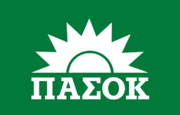 |
|
The Panhellenic Socialist Movement (Greek: Πανελλήνιο Σοσιαλιστικό Κίνημα, romanized: Panellínio Sosialistikó Kínima), better known as PASOK (ΠΑΣΟΚ), is a social-democratic political party in Greece. A social-democratic party generally supports fairness and government help for its citizens.
For many years, PASOK was one of the two main political parties in Greece, along with its rival, New Democracy. The party became less popular after the Greek debt crisis that began in 2009. However, it has since regained support and is now the second-largest party in the Greek Parliament.
PASOK was founded on September 3, 1974, by Andreas Papandreou. This was right after the fall of a military dictatorship in Greece, a period when the country was returning to democracy.
Contents
History of PASOK
How PASOK Started
PASOK was created in 1974, a very important year for Greece. The country had just ended seven years of rule by a military government, called the Greek military junta. The party's founder, Andreas Papandreou, was a charismatic leader whose father had also been a prime minister of Greece.
The new party's main goals were "National Independence, Popular Sovereignty, Social Emancipation, Democratic Process." This meant they wanted Greece to be independent, for the people to have the power, for society to be fair for everyone, and to have a democratic government.
In its first election in 1974, PASOK came in third place. But just three years later, in 1977, it became the second-largest party and the main opposition to the government.
PASOK in Government
In the 1981 election, PASOK won by a large margin. It formed the first socialist government in Greece in over 50 years. As prime minister, Andreas Papandreou's government made many important changes.
One of the biggest changes was creating a National Health System. This gave people, especially in rural areas, access to modern healthcare for the first time. The government also improved workers' rights, increased support for families, and gave more rights to women. For example, it ended the old system of dowry (where a bride's family gives money or property to the groom) and made civil marriage legal.
PASOK won again in 1985 and continued to govern. However, by the late 1980s, the party faced challenges, including accusations of financial wrongdoing. After a few years out of power, PASOK and Papandreou made a big comeback, winning the 1993 election.
The Modernization Era
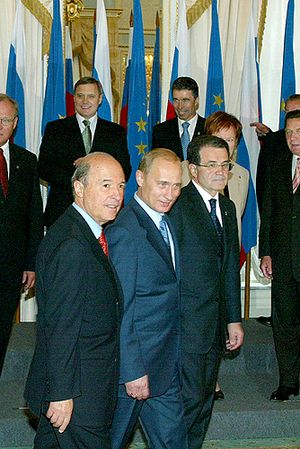
In 1996, Andreas Papandreou's health was failing, and he stepped down. Costas Simitis became the new leader of PASOK and the prime minister. Simitis was seen as a modernizer who wanted Greece to have stronger ties with the rest of Europe.
Under Simitis, Greece had two major successes. In 1997, the country won the bid to host the 2004 Summer Olympics in Athens. Then, in 2001, Greece was accepted into the Eurozone, which meant it could start using the euro as its currency. Simitis and PASOK won elections in 1996 and 2000.
Leadership of George Papandreou
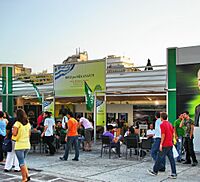
In 2004, George Papandreou, the son of the party's founder, became the new leader. However, in the election that year, PASOK lost to New Democracy after being in power for 11 years.
Papandreou led the party back to victory in the 2009 election. But this was just before the start of a major financial crisis in Greece. The government had to agree to a bailout plan with international organizations. This plan required tough spending cuts, which were very unpopular with the Greek people.
A Time of Decline
The government's handling of the debt crisis caused PASOK to lose a huge amount of support. In the 2009 election, the party had won with nearly 44% of the vote. By the January 2015 election, its support had fallen to less than 5%.
This dramatic fall in popularity became known as Pasokification. The term is now used across Europe to describe when a major center-left party suddenly loses most of its voters.
To try and stop the decline, the party formed alliances with other smaller parties. First, it created the Olive Tree alliance for the 2014 European elections. Then, it formed the Democratic Alignment for the September 2015 election.
The Movement for Change (KINAL)
In 2017, PASOK joined with other center-left groups to create a new political alliance called the Movement for Change, or KINAL. Fofi Gennimata, who had become PASOK's leader in 2015, was elected to lead the new alliance.
Under the KINAL name, the party started to slowly regain support. In the 2019 election, it became the third-largest party in the Greek Parliament.
After Fofi Gennimata sadly passed away in 2021, Nikos Androulakis was elected as the new leader.
The Return of PASOK
On May 9, 2022, the alliance officially changed its name back to PASOK – Movement for Change. It also brought back the party's famous green sun logo.
In the May 2023 election, PASOK-KINAL's support grew, and it won 41 seats in Parliament. This raised hopes that the party could once again become a major force in Greek politics. In the June 2023 election, the party won 32 seats, becoming the second-largest party in Parliament in November 2024 after some members of the main opposition party left.
International Connections
PASOK is part of several international groups of similar political parties. These include the Party of European Socialists and the Socialist International. In the European Parliament, its members are part of the Progressive Alliance of Socialists and Democrats group.
Election Results
Hellenic Parliament
| Election | Hellenic Parliament | Rank | Government | Leader | ||||
|---|---|---|---|---|---|---|---|---|
| Votes | % | ±pp | Seats won | +/− | ||||
| 1974 | 666,413 | 13.58% | New |
12 / 300
|
3rd | Opposition | Andreas Papandreou | |
| 1977 | 1,300,025 | 25.34% | +11.76 |
93 / 300
|
2nd | Opposition | ||
| 1981 | 2,726,309 | 48.07% | +22.73 |
172 / 300
|
1st | Government | ||
| 1985 | 2,916,735 | 45.82% | −2.25 |
161 / 300
|
1st | Government | ||
| Jun 1989 | 2,551,518 | 39.13% | −6.69 |
125 / 300
|
2nd | Opposition | ||
| Nov 1989 | 2,724,334 | 40.67% | +1.54 |
128 / 300
|
2nd | Coalition | ||
| 1990 | 2,543,042 | 38.61% | −2.06 |
123 / 300
|
2nd | Opposition | ||
| 1993 | 3,235,017 | 46.88% | +8.27 |
170 / 300
|
1st | Government | ||
| 1996 | 2,814,779 | 41.49% | −5.39 |
162 / 300
|
1st | Government | Costas Simitis | |
| 2000 | 3,007,596 | 43.79% | +2.40 |
158 / 300
|
1st | Government | ||
| 2004 | 3,003,988 | 40.55% | −3.34 |
117 / 300
|
2nd | Opposition | George Papandreou | |
| 2007 | 2,727,279 | 38.10% | −2.45 |
102 / 300
|
2nd | Opposition | ||
| 2009 | 3,012,373 | 43.92% | +5.82 |
160 / 300
|
1st | Government | ||
| May 2012 | 833,452 | 13.18% | −30.74 |
41 / 300
|
3rd | Snap election | Evangelos Venizelos | |
| Jun 2012 | 756,024 | 12.28% | −0.80 |
33 / 300
|
3rd | Coalition | ||
| Jan 2015 | 289,469 | 4.68% | −7.60 |
13 / 300
|
7th | Opposition | ||
| Sep 2015 | 341,390 (DISY) |
6.29% (DISY) |
+1.13 |
16 / 300
|
4th | Opposition | Fofi Gennimata | |
| 2019 | 457,519 (KINAL) |
8.10% (KINAL) |
+1.81 |
19 / 300
|
3rd | Opposition | ||
| May 2023 | 676,165 (PASOK–KINAL) |
11.46% (PASOK–KINAL) |
+3.36 |
40 / 300
|
3rd | Snap election | Nikos Androulakis | |
| Jun 2023 | 617,574 (PASOK–KINAL) |
11.84% (PASOK–KINAL) |
+0.38 |
31 / 300
|
3rd | Opposition | ||
European Parliament
| European Parliament | ||||||||
|---|---|---|---|---|---|---|---|---|
| Election | Votes | % | ±pp | Seats won | +/− | Rank | Leader | EP Group |
| 1981 | 2,278,030 | 40.12% | New |
10 / 24
|
New | 1st | Andreas Papandreou | SOC |
| 1984 | 2,476,491 | 41.58% | +1.46 |
10 / 24
|
1st | |||
| 1989 | 2,352,271 | 35.96% | −5.62 |
9 / 24
|
2nd | |||
| 1994 | 2,458,619 | 37.64% | +1.68 |
10 / 25
|
1st | PES | ||
| 1999 | 2,115,844 | 32.91% | −4.73 |
9 / 25
|
2nd | Costas Simitis | ||
| 2004 | 2,083,327 | 34.03% | +1.12 |
8 / 24
|
2nd | George Papandreou | ||
| 2009 | 1,878,859 | 36.65% | +2.62 |
8 / 22
|
1st | S&D | ||
| 2014 | 458,403 (Elia) |
8.02% (Elia) |
−28.63 |
2 / 21
|
4th | Evangelos Venizelos | ||
| 2019 | 436,726 (KINAL) |
7.72% (KINAL) |
−0.30 |
2 / 21
|
3rd | Fofi Gennimata | ||
| 2024 | 508,399 (PASOK–KINAL) |
12.79% (PASOK–KINAL) |
+5.07 |
3 / 21
|
3rd | Nikos Androulakis | ||
Party leaders
| # | Leader | Portrait | Term of office | Prime Minister | ||
|---|---|---|---|---|---|---|
| 1 | Andreas Papandreou |  |
3 September 1974 | 23 June 1996 | 1981–1989 1993–1996 |
|
| 2 | Costas Simitis |  |
30 June 1996 | 8 February 2004 | 1996–2004 | |
| 3 | George Papandreou |  |
8 February 2004 | 18 March 2012 | 2009–2011 | |
| 4 | Evangelos Venizelos |  |
18 March 2012 | 14 June 2015 | — | |
| 5 | Fofi Gennimata |  |
14 June 2015 | 25 October 2021 | — | |
| 6 | Nikos Androulakis |  |
12 December 2021 | Incumbent | — | |
Images for kids
See also
 In Spanish: Movimiento Socialista Panhelénico para niños
In Spanish: Movimiento Socialista Panhelénico para niños
- PASOKification
- History of Greece
- List of political parties in Greece
- Politics of Greece
 | Madam C. J. Walker |
 | Janet Emerson Bashen |
 | Annie Turnbo Malone |
 | Maggie L. Walker |


